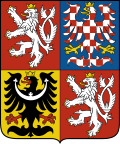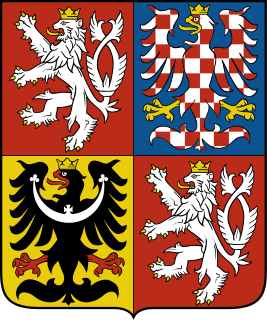
The Civic Democratic Alliance was a conservative-liberal political party in the Czech Republic, active between 1989 and 2007. The ODA was part of government coalitions until 1997 and participated in transformation of the Czech economy. The party was supported by president Václav Havel who voted for it in 1992 and 1996 election.

Parliamentary elections were held in the Czech Republic on 19 and 20 June 1998. The result was a victory for the Czech Social Democratic Party, which won 74 of the 200 seats. Voter turnout was 73.9%.

Legislative elections were held in the Czech Republic on 2 and 3 June 2006 to elect the members of the Chamber of Deputies.
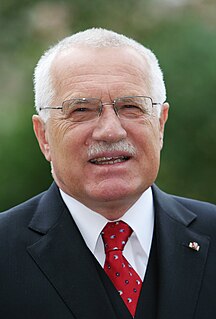
National Council elections were held in the Czech part of Czechoslovakia on 5 and 6 June 1992, alongside federal elections. The result was a victory for the Civic Democratic Party-Christian Democratic Party alliance, which won 76 of the 200 seats. Voter turnout was 85.0%. When the Czech Republic became independent in 1993, the National Council became its Parliament.

Senate elections were held in the Czech Republic for the first time on 15 and 16 November 1996, with a second round on 22 and 23 November. the first after independence. The result was a victory for the Civic Democratic Party, which won 32 of the 81 seats. Voter turnout was 34.9% in the first round and 30.6% in the second.

Senate elections for a third of chamber were held in the Czech Republic on 13 and 14 November 1998 with a second round on 20 and 21 November.

Senate elections were held in the Czech Republic on 12 November 2000, with a second round on 19 November. The result was a victory for the Civic Democratic Party, which won 22 of the 81 seats. Voter turnout was 33.4% in the first round and 21.5% in the second.

The 2003 Czech presidential election took place in January and February 2003 to elect a new President of the Czech Republic. The Parliament of the Czech Republic failed to elect a candidate on the first 2 ballots on the 15 and 24 January. However, on the third round of the third ballot on the 28 February, Václav Klaus was elected President.

The 2017 Czech legislative election was held in the Czech Republic on 20 and 21 October 2017. All 200 members of the Chamber of Deputies were elected and the leader of the resultant government – Andrej Babiš of ANO 2011, became the Prime Minister.

Senate elections were held in the Czech Republic on 7 and 8 October 2016, with a second round on 14 and 15 of October. The first round was held alongside regional elections and several municipal referendums, notably in a referendum in Brno on the location of the town's train station.
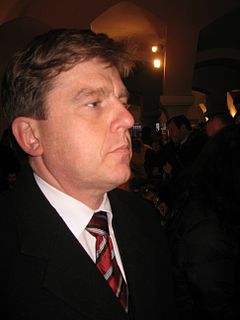
Election of the Speaker of the Chamber of Deputies of the Parliament of the Czech Republic was held in June, July and August 2006. Chamber of Deputies was unable to elect new Speaker for 2 months. Miloslav Vlček was eventually elected the new Speaker. Vlček was considered a provisory Speaker but remained in the position shole term.
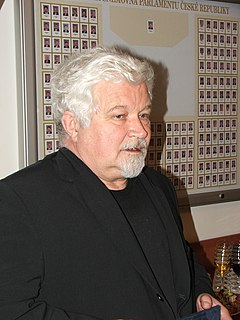
An election of the President of the Senate of the Czech Republic was held on 18 December 1996. Petr Pithart was elected the first President of the Senate. Pithart was a candidate of the Christian and Democratic Union – Czechoslovak People's Party (KDU-CSL), and his election was opposed primarily by the Civic Democratic Party.

An election of the President of the Senate of the Czech Republic was held on 16 December 1998. Libuše Benešová was elected the new President, defeating the incumbent Petr Pithart.

Senate elections were held in the Czech Republic on 5 and 6 October 2018 alongside municipal elections, with a second round held on 12 and 13 October 2018. The Conservative Civic Democratic Party (ODS) won the election with 10 seats. Governing parties ANO 2011 and the Czech Social Democratic Party were heavily defeated, winning only 1 seat each. The Communist Party lost its last seat in the Senate when Václav Homolka failed to be re-elected, meaning the party would be without representation in the Senate for the first time in the history of Czech Republic. The election was considered the first major win for the opposition to Andrej Babiš' Cabinet. Commentators including Josef Kopecký also noted ODS confirmed their position as the main opposition party, ahead of the Czech Pirate Party.

A by-election for the Zlín Senate seat in the Czech Republic was held on 18 and 19 May 2018 as a result of František Čuba's resignation. The second round was heldr 25 and 26 May 2018. Michaela Blahová and Tomáš Goláň advanced to second round. The election was surprisingly won by Tomáš Goláň. Voter turnout was very low.
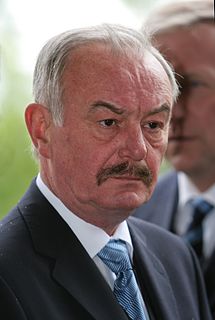
Election of the President of the Senate of the Czech Republic was held on 29 November 2006. Přemysl Sobotka wa reelected for second term.

An election of the President of the Senate of the Czech Republic was held on 4 December 2002. Petr Pithart was re-elected as the President of the Senate.

An election of the President of the Senate of the Czech Republic was held on 16 December 2000. Petr Pithart was elected the new President of the Senate.

A by-election for the Prague 9 Senate seat in the Czech Republic will be held on 5 and 6 April 2019. The incumbent Senator Zuzana Baudyšová announced her resignation on 29 January 2019. She was elected as a candidate of ANO 2011. Baudyšová resigned due to health difficulties.
